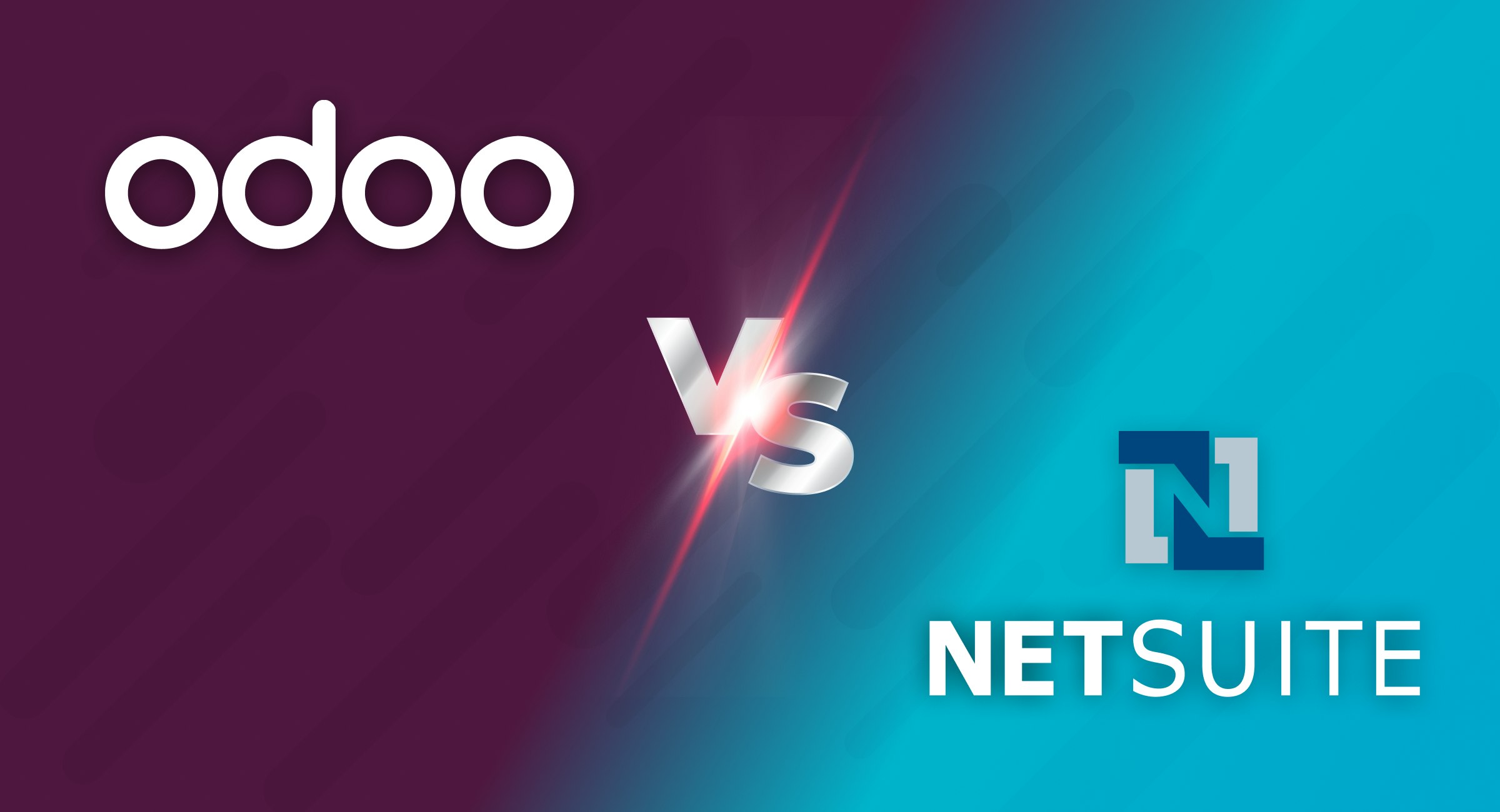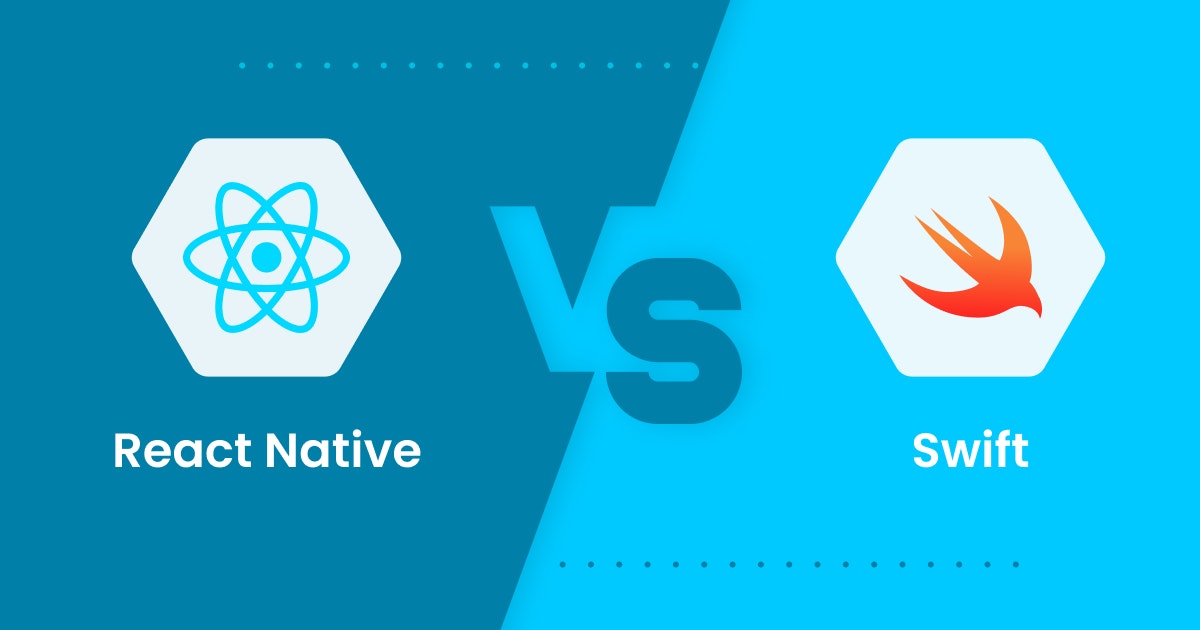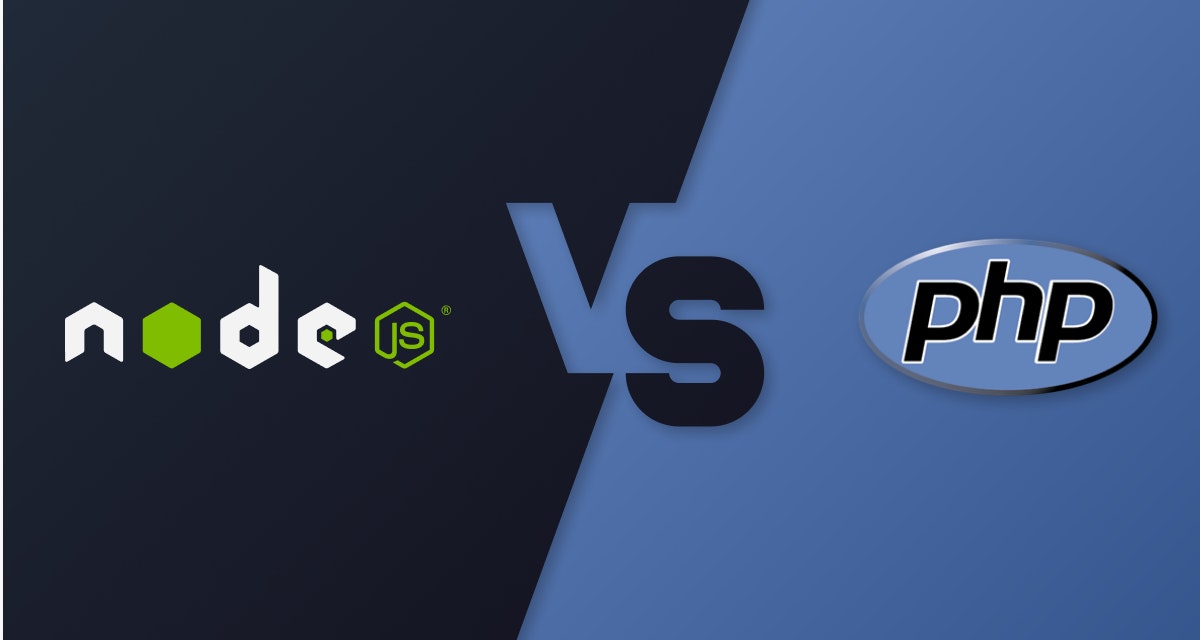Table of Content
What Is Odoo?
Odoo is an open-source ERP platform that is comprehensive and adaptable and provides several included business applications. Odoo, formerly known as OpenERP, offers a variety of functions to streamline several business processes, including sales, CRM, accounting, manufacturing, inventory, and more. It is a flexible solution for enterprises of all sizes and industries because its modular approach allows them to select and configure the individual applications that best meet their needs.
Since Odoo ERP is open-source, enterprises may extensively customize it to fit their needs and workflows. Additionally, it has a strong user and developer community that promotes ongoing development, updates, and support. Odoo also has a commercial version called Odoo Enterprise, with additional functionality and expert support services.
What Is Netsuite?
Oracle created the cloud-based ERP software program known as Netsuite. It offers a complete set of business management tools to simplify various tasks and activities for medium to large businesses. Since Netsuite ERP is cloud-based, you can easily access it with an internet connection, eliminating the requirement for on-premise server infrastructure.
ERP, CRM (Customer Relationship Management), financial management, e-commerce, human resources, inventory management, project management, and other features are all included in the feature-rich Netsuite platform. Businesses may consolidate their operations using an all-inclusive strategy, get real-time performance insights, and make data-driven decisions to boost productivity and growth.
The system is ideal for organizations in various industries, including manufacturing, services, software firms, wholesale distribution, and retail. With regular upgrades and expert support services, Netsuite continues to be a well-liked option for businesses looking for a strong and flexible ERP solution to match their changing needs.
Odoo vs. Netsuite: A Comparison
Let us examine a variety of features of Odoo and Netsuite in this thorough comparison to understand their distinctions, benefits, and drawbacks. This will help you make an informed choice based on your unique needs.
1. Deployment and Accessibility
Odoo: Odoo offers flexibility in on-premises and cloud-based deployments. Businesses can use Odoo's cloud infrastructure or host the program on servers. Customization and security options give businesses control over their data and system. On-premise deployment requires more IT resources for upkeep and upgrades.
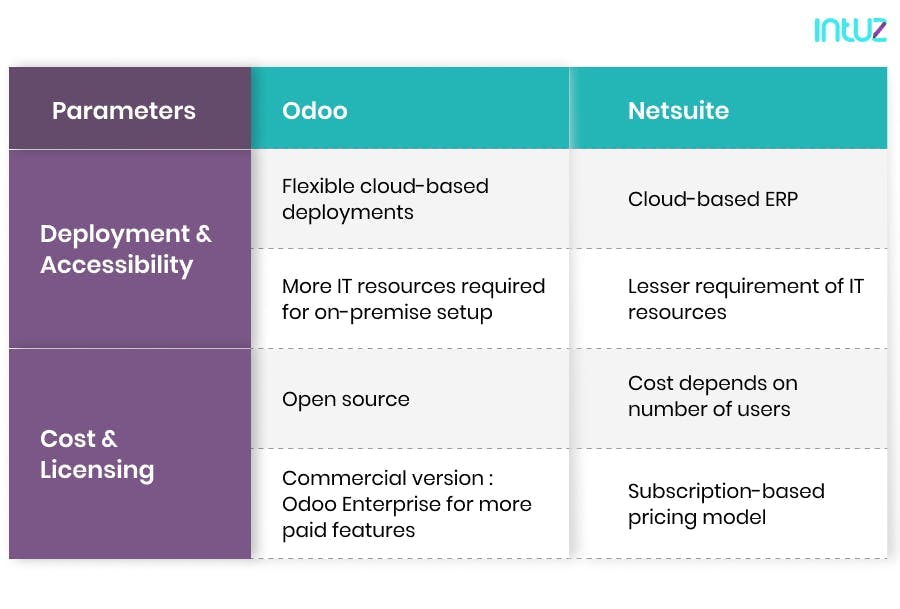
2. Cost and Licensing
Odoo: One of its main benefits is Odoo's open-source nature, which makes the software free to use. Businesses could, however, have to pay for hosting, implementation, modification, and maintenance. Odoo also has a commercial version called Odoo Enterprise, with more sophisticated features and expert support services.
Netsuite: The cost of using Netsuite is determined by the number of users and the particular modules that are needed, and it is based on a subscription-based pricing model. This may result in a higher initial outlay of funds, particularly for large to mid-sized businesses with complex system requirements. However, the subscription fee includes upkeep, assistance, and upgrades, which eliminates the need for further costs.
3. Customization and Flexibility
Odoo: As an open-source ERP, Odoo provides broad customization options and high flexibility. The software's source code may be changed by businesses to fit their particular workflows and processes, making it the best choice for businesses with particular needs. Organizations may select and configure the apps they require with the help of Odoo development and modular design, minimizing needless complexity.
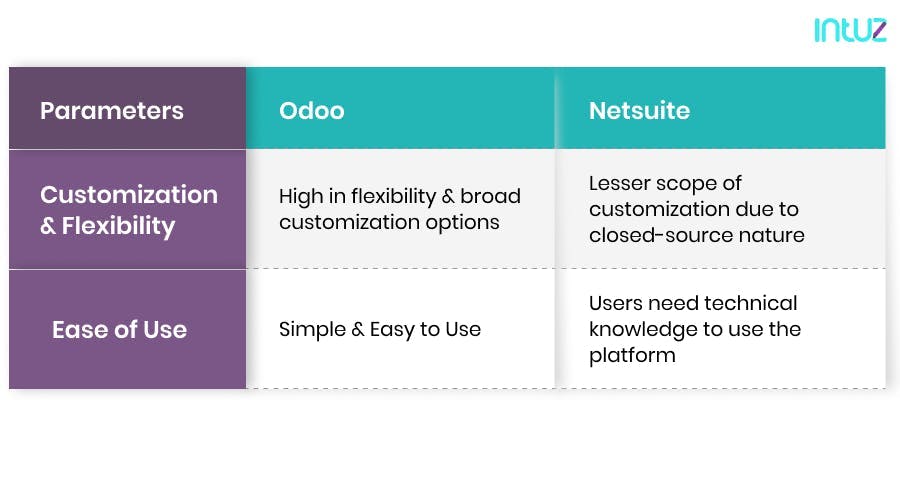
4. Ease of Use
Odoo: Odoo is accessible to people without technical knowledge thanks to its user-friendly interface and intuitive design. Its layout strongly emphasizes simplicity and ease of use, which makes the onboarding process for new users go more smoothly. Additionally, Odoo gains from a vibrant community that supports users and offers thorough documentation.
Netsuite: Netsuite's interface may appear more complicated for users unfamiliar with ERP systems. Employees may need more intensive training to use the platform properly because it has a steeper learning curve. However, Netsuite's comprehensive capability can greatly increase overall productivity once users acclimate to it.
5. Scalability
Odoo: Odoo can be scalable to handle growth and shifting needs and is appropriate for small to medium-sized organizations. However, the scalability may differ depending on the complexity of the customization and the hosting infrastructure. Larger businesses can consider utilizing Odoo Enterprise, which provides more sophisticated features and better performance.
Netsuite: Focusing on serving mid-sized to large businesses, Netsuite is renowned for its scalability. Its strong architecture makes it the perfect option for businesses with ambitious growth goals because it can easily handle growing user bases, increased data volume, and complex business processes.
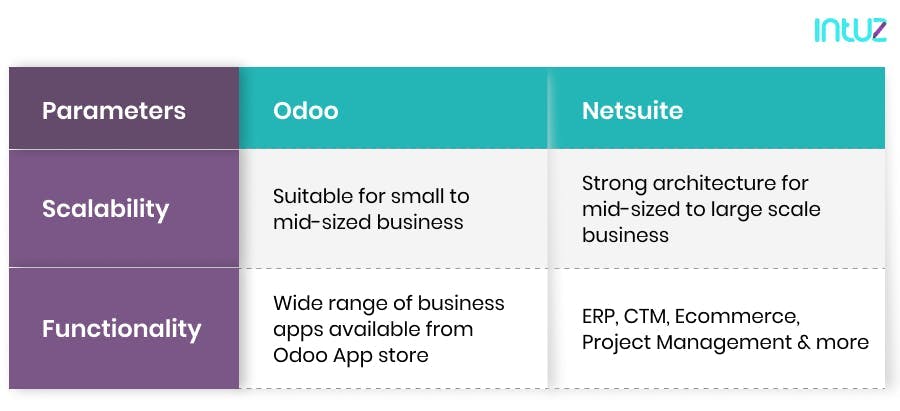
6. Functionality
Odoo: A wide range of business apps are available from Odoo integration, including those for CRM, sales, buying, inventory, manufacturing, accounting, human resources, and more. Businesses may adopt Odoo to suit their unique requirements thanks to the availability of several modules and the possibility of installing third-party connectors from the Odoo App Store.
Netsuite: Similar to Odoo, which offers many features like ERP, CRM, financial management, e-commerce, project management, and more. The all-in-one platform method Netsuite uses allows businesses to manage all facets of their operations from a single platform.
7. Industry Focus
Odoo: Odoo can accommodate a variety of industries thanks to its adaptability and customizability. It is well-established in manufacturing, retail, services, hotels, and more. Because it is open-source, more industry-specific modules can be made, increasing its usefulness.
Netsuite: Many businesses, including wholesale distribution, retail, manufacturing, software, and services, use Netsuite extensively. Companies operating in these sectors benefit from its focus on mid-sized to big corporations, which corresponds well with their needs for a reliable and scalable ERP solution.
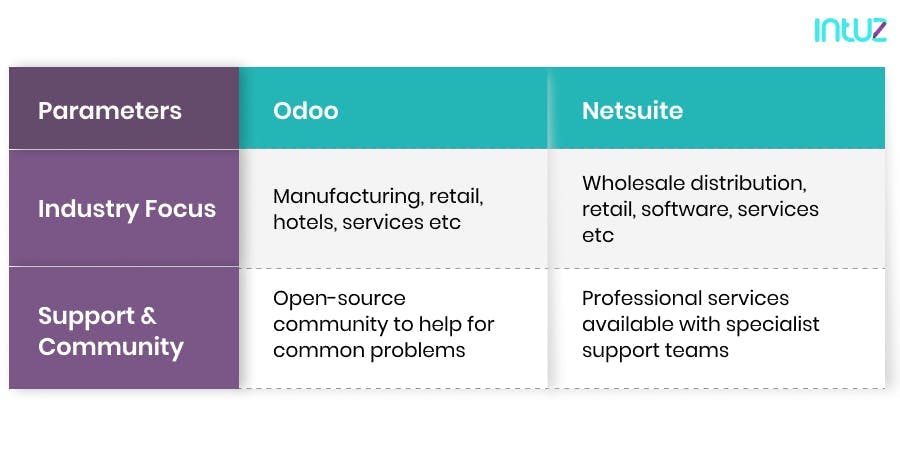
8. Support and Community
Odoo: The vibrant open-source community that supports, develops, and documents the Odoo platform makes regular contributions. Thanks to the availability of community-driven resources, users are guaranteed access to insights from seasoned developers and solutions to common problems.
Netsuite: Professional support services are available through Netsuite and are part of the membership fee. Therefore, businesses can rely on specialist support teams to assist them with any technological issues or questions they may have while using the system.
Odoo Development & Customization Services Company
Consult NowConclusion
In conclusion, both ERP platforms Netsuite and Odoo each have their benefits. Due to its open-source nature, extensive customization options, and affordable pricing, Odoo stands out as a viable alternative for small and medium-sized businesses. On the other hand, because of its robust functionality, cloud-based architecture, and scalability, Netsuite is a fantastic choice for mid-sized to large enterprises with complex requirements.
The choice between Odoo and Netsuite ultimately depends on your business's size, needs, budget, and long-term growth plan. It is crucial to carefully evaluate the features and capabilities of both systems before choosing one and, if possible, to view demos or pilot installations. To find the best ERP system for your company's goals, book a free consultation with an expert.
